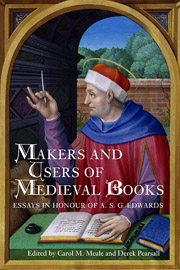Book contents
- Frontmatter
- Contents
- List of Illustrations
- Contributors
- Preface
- List of Abbreviations
- COMPOSITION
- Winning and Wasting in Wynnere and Wastoure and Piers Plowman
- The Reference Work in the Fifteenth Century: John Whethamstede's Granarium
- Pageants Reconsidered
- COMPILATION
- PRODUCTION
- OWNERS, PATRONS, READERS
- AFTERLIVES
- A. S. G. Edwards: List of Publications
- Index of Manuscripts and Early Printed Books
- General Index
- Tabula Gratulatoria
Winning and Wasting in Wynnere and Wastoure and Piers Plowman
from COMPOSITION
Published online by Cambridge University Press: 05 May 2014
- Frontmatter
- Contents
- List of Illustrations
- Contributors
- Preface
- List of Abbreviations
- COMPOSITION
- Winning and Wasting in Wynnere and Wastoure and Piers Plowman
- The Reference Work in the Fifteenth Century: John Whethamstede's Granarium
- Pageants Reconsidered
- COMPILATION
- PRODUCTION
- OWNERS, PATRONS, READERS
- AFTERLIVES
- A. S. G. Edwards: List of Publications
- Index of Manuscripts and Early Printed Books
- General Index
- Tabula Gratulatoria
Summary
The poem Wynnere and Wastoure has been preserved only in a copy made by Robert Thornton about the middle of the fifteenth century, but internal evidence shows that it was composed about a century earlier, quite probably in 1353. The first version of Piers Plowman, on the other hand, cannot be earlier than 1362, the date of the great storm to which the A Text alludes at V, 14–20, and it was probably composed several years after that. So it may be, as several writers have suggested, that Langland's poem owes something to its predecessor. Ralph Hanna argues that Piers Plowman began, with the Prologue and first four passus of the A Text, ‘in a tolerably conventional alliterative mode, as a single-vision satire of contemporary conditions’, owing at that stage ‘a pervasive debt’ to Wynnere and Wastoure. Hanna sees a clear allusion to the older poem in A Prologue, 22, which says of honest farm-workers that they ‘[Wonne] þat þise wastours wiþ glotonye destroi3eþ’; and he further compares Langland's dream introduction (A Prologue,7–10) with the corresponding lines in Wynnere and Wastoure (32–3, 41–7), and also the end of the Prologue (A Prologue, 104–8) with a passage towards the end of the older poem (472–95). A closer verbal parallel than any of these may be found near the end of Langland's second vision, where it is said of idle beggars that ‘Þei wedde no womman þat hy wiþ delen / But as wilde bestis wiþ wehe, & worþ vp togideris’ (A VIII, 73–4, similar in B VII, 91–2).
- Type
- Chapter
- Information
- Makers and Users of Medieval BooksEssays in Honour of A.S.G. Edwards, pp. 1 - 12Publisher: Boydell & BrewerPrint publication year: 2014



